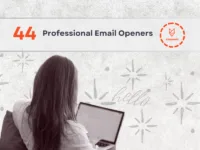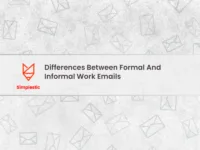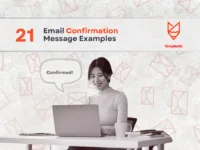Crafting effective work emails is essential for clear communication in a professional environment. Whether you’re reaching out to colleagues, clients, or management, a well-structured email can convey your message effectively and foster collaboration. In this guide, we’ll provide examples of different types of work emails, along with tips on how to write them and answers to common questions.
Email remains a fundamental tool for workplace communication. Used effectively, it can enhance collaboration, clarify expectations, and build professional relationships. However, poor email habits can lead to misunderstandings, missed opportunities, and even damage to your reputation. Here are the most important best practices for writing and managing work emails:
1. Use a Clear and Relevant Subject Line
Your subject line should succinctly summarize the purpose of your email. This helps recipients prioritize and locate messages quickly. For example:
- “Project Update: Q2 Marketing Campaign”
- “Request: Feedback on Presentation Slides by Friday”
Avoid vague subjects like “Hi” or “Question.”
2. Keep Your Message Concise and Focused
Respect your recipient’s time by getting to the point quickly.
- Start with a brief greeting.
- State the purpose of your email in the opening sentences.
- Use short paragraphs and bullet points for clarity.
- Include only necessary details and actionable items.
If your message is long, consider if a meeting or phone call would be more effective.
3. Use Professional Language and Tone
Maintain a courteous, professional tone—even if you know the recipient well.
- Avoid slang, emojis, and overly casual expressions.
- Proofread for grammar and spelling errors.
- Be respectful, especially when discussing sensitive topics.
4. Address the Right People
Send your email only to those who need to be involved.
- Use “To” for primary recipients.
- Use “Cc” for those who should be informed but aren’t required to act.
- Avoid overusing “Reply All” (source).
5. Format for Readability
Make your email easy to scan and understand.
- Use clear paragraphs and white space.
- Bold or underline important points (sparingly).
- Use bullet points or numbered lists for steps or requests (source).
6. Be Mindful of Attachments and Links
- Reference attachments in the body of your email (e.g., “Please see the attached report”).
- Use descriptive file names.
- Ensure links are correct and safe.
7. Respond Promptly
Aim to reply within 24 hours, even if only to acknowledge receipt and provide a timeline for a full response. If you need more time, let the sender know when they can expect a reply (source).
8. Use a Professional Signature
Include your full name, title, company, and contact information in your email signature. This helps recipients know who you are and how to reach you.
9. Respect Privacy and Confidentiality
- Double-check recipients before sending, especially with sensitive information.
- Use Bcc for mass emails to protect privacy.
- Avoid sharing confidential information unless necessary and authorized.
10. Proofread Before Sending
Always review your email for errors, clarity, and tone before hitting send. Check that all attachments are included and that you’ve answered any questions asked.
Additional Tips
- Out-of-Office Replies: Set up an automatic response when you’re away, indicating when you’ll return and who to contact in your absence.
- Avoid Email Overload: Don’t use email for urgent or complex issues—pick up the phone or schedule a meeting instead.
- Archive and Organize: Regularly clean your inbox, archive important messages, and use folders or labels for organization (source).
Following these best practices will help you communicate more effectively, maintain professionalism, and build stronger workplace relationships.
How to Write a Work Email
- Subject Line:
Use a concise and informative subject line that clearly indicates the purpose of your email. For example, “Project Update: [Project Name]” or “Meeting Request: [Date and Time]”. - Greeting:
Start with a polite greeting. Use the recipient’s name if you know it, such as “Hi [Name]” or “Dear [Name]”. - Opening Statement:
Begin with a friendly opening or a brief acknowledgment of previous communications. This sets a positive tone for your email. - Main Content:
Clearly state the purpose of your email. Use short paragraphs or bullet points for easy readability. Be direct but polite, and provide any necessary details or context. - Call to Action:
If you need a response or action from the recipient, make it clear. Most of the work email examples below will reflect a specific call to action. For example, “Please let me know your availability for a meeting” or “I would appreciate your feedback on this proposal.” - Closing:
End with a polite closing statement, thanking the recipient or expressing anticipation for their response. - Signature:
Include your name, title, and any relevant contact information.
Work Email Examples
Example 1: Meeting Request
Subject: Request for Meeting on [Date]
Hi [Name],
I hope this message finds you well. I would like to schedule a meeting to discuss [specific topic or project]. Are you available on [suggested date and time]?
Please let me know if that works for you or if there’s another time that would be more convenient.
Thank you, and I look forward to your reply!
Best regards,
[Your Name]
[Your Title]
[Your Contact Information]
Example 2: Project Update
Subject: Project Update: [Project Name]
Dear [Team/Recipient’s Name],
I wanted to provide you with an update on the [Project Name]. As of today, we have completed the following tasks:
- [Task 1]
- [Task 2]
- [Task 3]
We are on track to meet our deadline of [deadline date]. If you have any questions or need further details, please feel free to reach out.
Thank you for your continued support!
Best,
[Your Name]
[Your Title]
[Your Contact Information]
Example 3: Follow-Up Email
Subject: Follow-Up on [Previous Discussion/Meeting]
Hi [Name],
I hope you’re doing well. I wanted to follow up on our recent discussion about [specific topic or project]. Have you had a chance to consider [specific question or proposal]?
I would appreciate your feedback and any thoughts you might have.
Thank you, and I look forward to hearing from you soon!
Warm regards,
[Your Name]
[Your Title]
[Your Contact Information]
Example 4: Acknowledgment of Receipt
Subject: Acknowledgment of Receipt: [Document/Proposal Name]
Dear [Name],
Thank you for sending over the [document/proposal name]. I have received it and will review it by [specific date]. I appreciate your promptness in providing this information.
If I have any questions or need further clarification, I will reach out.
Best regards,
[Your Name]
[Your Title]
[Your Contact Information]
Example 5: Thank You Email
Subject: Thank You!
Hi [Name],
I just wanted to take a moment to thank you for [specific reason, e.g., your help with the project, attending the meeting, etc.]. Your support and insights were invaluable, and I truly appreciate your effort.
Looking forward to our continued collaboration!
Best,
[Your Name]
[Your Title]
[Your Contact Information]
Work Email Examples for Various Scenarios
Here are Work Email Examples for different scenarios for work emails, complete with examples for each situation:
1. Meeting Confirmation
Subject: Confirmation of Meeting on [Date]
Hi [Name],
I hope this message finds you well. I am writing to confirm our meeting scheduled for [date] at [time]. We will be meeting in [location/online platform].
Please let me know if you have any topics you would like to discuss or if there are any changes to your availability.
Looking forward to our conversation!
Best regards,
[Your Name]
[Your Title]
[Your Contact Information]
More: 35 Simple Meeting Invitation Email Sample Templates
2. Request for Information
Subject: Request for Information on [Specific Topic]
Dear [Name],
I hope you’re doing well. I am currently working on [specific project or task] and would appreciate your insights regarding [specific information you need].
If you could share any relevant documents or resources by [specific date], it would be incredibly helpful.
Thank you for your assistance!
Best,
[Your Name]
[Your Title]
[Your Contact Information]
3. Introducing a New Team Member
Subject: Welcome [New Team Member’s Name] to the Team!
Hi Team,
I am excited to introduce [New Team Member’s Name], who will be joining us as [New Team Member’s Position] starting [start date]. [He/She/They] will be working on [brief description of responsibilities].
Please join me in welcoming [him/her/them] to the team. Feel free to reach out to [him/her/them] at [email address] to say hello!
Best,
[Your Name]
[Your Title]
[Your Contact Information]
More: Introducing Someone Via Email Sample
4. Project Deadline Reminder
Subject: Reminder: Upcoming Project Deadline
Hi [Team/Name],
This is a friendly reminder that the deadline for [Project Name] is approaching on [due date]. Please ensure that all tasks are completed and submitted by then.
If you have any questions or need assistance, don’t hesitate to reach out.
Thank you for your hard work!
Best regards,
[Your Name]
[Your Title]
[Your Contact Information]
5. Feedback Request
Subject: Request for Feedback on [Document/Project]
Dear [Name],
I hope you’re well. I have completed the draft of [Document/Project Name] and would greatly appreciate your feedback. Your insights would be invaluable in refining the final version.
If possible, could you please review it by [specific date]? Thank you for your help!
Best,
[Your Name]
[Your Title]
[Your Contact Information]
6. Apology for Delay
Subject: Apologies for the Delay
Hi [Name],
I want to sincerely apologize for the delay in [specific task or response]. [Brief explanation of the reason, if appropriate, e.g., unexpected circumstances].
I am currently working on it and will ensure it is completed by [new deadline]. Thank you for your understanding.
Best regards,
[Your Name]
[Your Title]
[Your Contact Information]
More: 27 Professional Apology Email Templates
7. Sharing a Resource
Subject: Resource on [Topic]
Hi [Name],
I came across this resource on [specific topic] and thought you might find it useful: [link or attachment]. It provides some great insights that could benefit our current project.
Let me know what you think!
Best,
[Your Name]
[Your Title]
[Your Contact Information]
8. Thank You Email After a Meeting
Subject: Thank You for Your Time
Dear [Name],
Thank you for taking the time to meet with me today. I appreciated our discussion about [specific topic] and found your insights very helpful.
Looking forward to implementing our ideas and collaborating further!
Best regards,
[Your Name]
[Your Title]
[Your Contact Information]
More: 15 Post Interview Thank You Email Examples
9. Notification of Policy Change
Subject: Important Update: Policy Change
Hi Team,
I want to inform you about a change in our [specific policy, e.g., remote work policy]. Effective [date], [brief description of the change].
Please review the updated policy document attached and feel free to reach out if you have any questions or concerns.
Thank you for your attention to this matter.
Best,
[Your Name]
[Your Title]
[Your Contact Information]
10. End-of-Year Review Reminder
Subject: Reminder: End-of-Year Performance Reviews
Dear Team,
As we approach the end of the year, I want to remind everyone that performance reviews will be conducted from [start date] to [end date]. Please prepare your self-assessments and any supporting documents you would like to discuss.
If you have any questions about the review process, don’t hesitate to reach out.
Thank you!
Best regards,
[Your Name]
[Your Title]
[Your Contact Information]
Key Takeaways
- Use a Professional Salutation:
Choose an appropriate greeting to set the right tone. See 41 Email Salutation Examples for inspiration. - Be Clear and Concise:
Structure your message for clarity and brevity. Review Task Completion Email to Manager | Tips and Examples for concise communication templates. - Use a Polite and Professional Sign-off:
End your email with a courteous closing. Explore the Ultimate List of 57 Sign Off Examples for professional options. - Respond Promptly and Appropriately:
If you’re unavailable, set up an automated response. Find guidance in the Automated Email Response Guide and Examples. - Maintain Professional Tone, Even When Upset:
Learn how to address difficult situations while remaining respectful in How to Write an Angry Email Professionally.
FAQs | Work Email Examples
1. How long should my work email be?
- Aim for brevity and clarity. Keep your emails concise, ideally no longer than a few short paragraphs, while ensuring you include all necessary information.
2. Should I use a formal tone in all work emails?
- The tone of your email should match the relationship you have with the recipient. Use a more formal tone for clients or upper management, and a more casual tone for colleagues you know well.
3. Is it necessary to include a subject line?
- Yes, always include a subject line. It helps the recipient understand the purpose of your email at a glance and makes it easier to find later.
4. What should I do if I don’t receive a response?
- If you don’t receive a response within a reasonable timeframe (usually a few days), it’s appropriate to send a polite follow-up email.
5. Can I use emojis in work emails?
- It depends on your workplace culture. In more casual environments, emojis may be acceptable, but in formal settings, it’s best to avoid them to maintain professionalism.
Writing effective work emails is a key skill that can enhance communication and collaboration in the workplace. By following the examples and tips provided, you can create clear, professional emails that convey your message effectively. Remember to tailor your emails to your audience and context to foster positive relationships and achieve your objectives.




